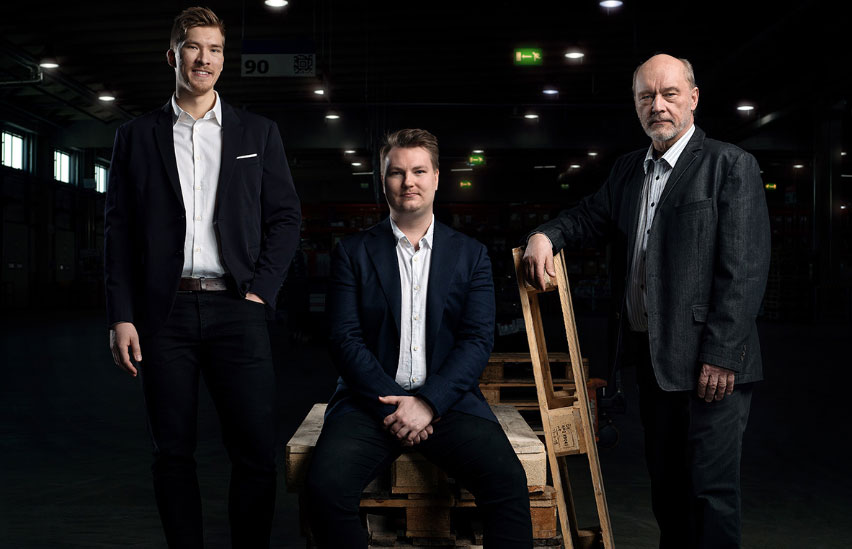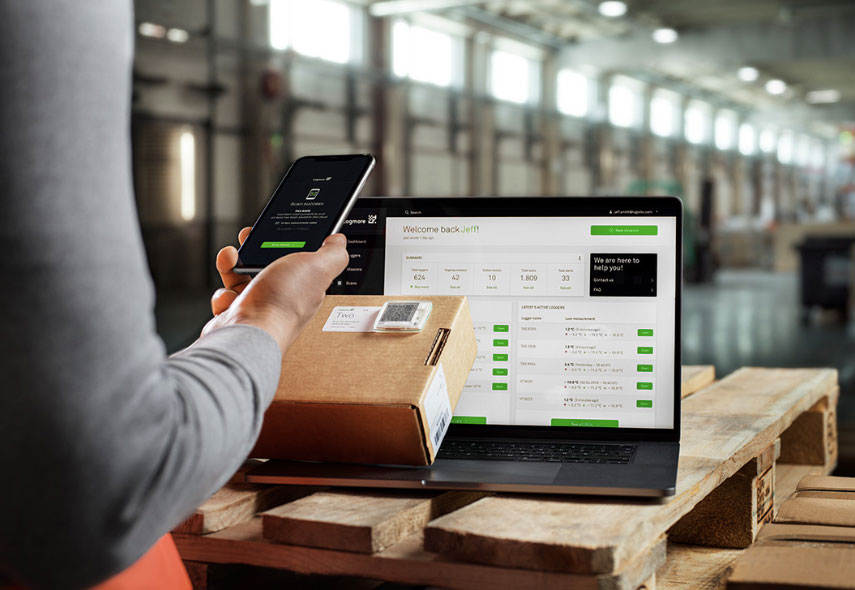CEO Spotlight: Janne Juhala, Co-founder and CEO of Logmore on the Future of Supply Chain Data Logging

Technology has enabled entrepreneurs of today to approach business with a global perspective. E-commerce allows just about anyone to conduct cross-border commerce. Online marketplaces, digital payments, and international shipping have allowed even smaller businesses to source products from anywhere in the world and sell them in their respective markets.
However, as with most sectors experiencing rapid progress, players are bound to be experience growing pains. For instance, while logistics has considerably improved in the speed and scale needed for goods to move about quickly worldwide, customers are still likely to complain about how their packages are being handled and cared for in transit. Businesses that deal with fragile, volatile, and perishable goods like those in food, electronics, and pharmaceuticals collectively lose billions in waste brought about by inefficient supply chains. About 30 percent of the total food produce globally is wasted due to problems in supply chains.
Technology startup Logmore aims to help solve these issues through its novel dynamic QR tags and data logging service. The company enables businesses to monitor the condition of their packages as they more through the supply chain using sensor-equipped dynamic QR data loggers and the cloud. The Finland-based company recently closed a €4.5 million funding round to fuel its expansion worldwide.

We recently sat down with Logmore’s co-founder and CEO, Janne Juhala, to talk about the evolving role of technology in supply chains. Juhala has over nine years of experience in the information and technology industry handling various roles. Prior to founding Logmore, he also served as CTO of tech ventures Conexbird and jyDev.
Technology has helped spur on the growth of cross-border commerce in recent years. What sort of impact has this boom made on supply chains and logistics?
The industry is growing quite rapidly. Everyone’s participating in e-commerce and customers love how they can even get same day deliveries on their purchases. I think it was FreightWaves that stated that the total global logistics market could be over $12 trillion in a few years.
To cope with these changes, companies have become more data-driven. On the one hand, regulations force a level of monitoring and the industry just has to comply by implementing monitoring and reporting mechanisms. On the other hand, many see that technology can make their operations more efficient. Since the industry has become quite competitive, it’s crucial that you have that edge over your competitors. Cutting losses and having even a slight improvement in margins for each shipment can make a huge difference in the big picture.
How about the pain points? What kinds of problems still nag the industry?
The biggest challenge right now is getting rid of paper. There’s a huge amount of paper going on around the world for reporting, and just general communication. You’d think people would use the opportunity to go paperless and digital since they have it now.
There’s also a lot of different ways to go digital. Right now the information is fragmented. Having one clear standard would make cooperation both inside and outside companies much more efficient and transparent.
The last mile has become a big focus lately. Some companies state that the costs are more than half of their whole logistics costs. And that doesn’t even account for the waste caused during unmonitored distances like the time between unloading products from the truck and getting them into controlled storage.
Many companies successfully collect a lot of data but don’t really use it. They feel data management or reporting, or analytics takes too much time, which is often true. Some companies still don’t even have more than the bare minimum in regards to data collection. It would be difficult, if not impossible, to get a real clear picture of what’s happening when you don’t have the right data to use for analysis.
Big data has been considered a game-changer for many industries? How can data and analytics be leveraged to solve supply chain issues?
Improving efficiency is the biggest thing. Pretty much everything else falls under it in one way or another. Shipping routes can be optimized, so can package handling and storage.
Data and analytics can be used to counter problems before and after they happen. Recording data from what happens lets you recognize patterns. Negative patterns can then be avoided in the future by adjusting operations.
You can use data for insurance purposes retroactively, too. Take a suitable cargo insurance, monitor what happens to your shipment, and you’ll have proof of when and likely where damages occur.
So how does Logmore fit in the grand scheme of things? What is it exactly that you offer?
We’re in the business of condition monitoring. Our solution combines our own data loggers and the cloud to make a one-stop shop for keeping track of the conditions to which packages are exposed as such as temperature variance, humidity levels, shocks, and even ambient light. We want to emphasize scalability to fit the trend of growth in the logistics industry.
For scalability, we need to have a lightweight solution. In fact, our patented dynamic QR codes are both the data storage and the transmission system. Users can simply place our tags on their packages and the device’s sensors will automatically log condition data. The QR code changes to reflect the data. Once the QR code is scanned, the collected data is uploaded into our cloud service. There’s no requirement to build a large infrastructure and it’s much faster than the alternatives.
The simplicity makes it really easy to integrate our service to existing company cloud services or intranets as well.
What advantages does Logmore bring compared to other logging and tracking technologies, for example, in conventional parcel tracking and RF beacons and tags?
This list sounds utopic, but it’s true. Our users don’t have to reconfigure their infrastructure or buy specialized scanners and hardware. Just having a smartphone is enough to use our service. Data retrieval can be done on the fly using any smartphone’s camera. Those with user access to the dashboard can even analyze that data right away in the smartphone’s web browser.
Compared to the more traditional companies in the industry, Logmore is much cheaper, easier, and more reliable. A lot of companies use USB loggers, which must be connected to a PC with a cable for data transmission. That takes roughly five minutes per logger. Logmore’s data retrieval takes a maximum of five seconds per logger.
RFID and NFC are fast, but these usually require either a special device or special software. Large scale users of those technologies will probably want gateways, which are expensive and can’t be built just anywhere, especially if they ship packages to a lot of different places. When shipping only from a specific point A to a specific point B regularly without variation, there’s a clear use case for RFID.
How can supply chain stakeholders benefit from your service?
We envision helping the entire logistics industry to become more efficient and cut waste. Imagine if we can help reclaim the billions of dollars’ worth of products that gets lost due to supply chain inefficiencies. Consumers should benefit too as companies’ savings can translate into better quality and more affordable products that everyone can enjoy.
There’s practically no device or software requirements to the Logmore service, so it can be scaled endlessly. Industries could quickly adopt the system and have no difficulty using it across their entire supply chain, from producer to shipper to carrier to retailer to customer.
Similarly, a single company can save a lot of money by improving their processes. Company specific adjustments and tailoring done to digital systems can make almost anything possible. Something as small as a customized scan view allows highly specialized instant reporting, while integrations can create automated workflows to suit the company’s needs 100 percent.
The company and its partners can also use the system seamlessly across their shared operations. No matter the scale, collecting and analyzing the data are really easy, resulting in actionable insights that they can use to fix problems and improve their processes.
What challenges do you foresee for companies and their supply chains in the near future?
Logistics is a traditional industry. Trucks will fill roads as they already do, planes will keep flying. Tech developments like artificial intelligence (AI) and robots taking the driver or pilot’s role will surely be interesting and controversial. Even if engineers finally crack driverless transport, it will still pose new challenges in terms of legislation. Political decisions regarding new forms of criminal activity that will eventually emerge could change the way companies have to do things.
Information security is probably among the biggest issues that we face today and it is likely to persist, even grow. We already see news about medical Internet-of-Things (IoT) devices being cybersecurity risks. If someone is capable and willing to hack those, then attacking vulnerable logistics systems is possible as well.
I think taking cybersecurity seriously is the priority when building new tech-driven solutions. There should be multiple layers of security that create a composite defense again threats.
How are you positioning Logmore to become a key player in the industry?
Pushing down the price of data logging while keeping the monitoring functions versatile creates both savings and new use cases. We’re already on the track to be able to produce the service so affordably that there could be a Logmore logger on every single cardboard box containing food or pharmaceuticals in the near future. We’re very excited by that prospect.
Have you read?
World’s Top 100 Most Successful Unicorns.
The World’s Richest Tech billionaires.
World’s Most Stressed-Out Cities For Employees.
Luxury Superyacht Charter with Aegean Luxury Yachting.
Bring the best of the CEOWORLD magazine's global journalism to audiences in the United States and around the world. - Add CEOWORLD magazine to your Google News feed.
Follow CEOWORLD magazine headlines on: Google News, LinkedIn, Twitter, and Facebook.
Copyright 2025 The CEOWORLD magazine. All rights reserved. This material (and any extract from it) must not be copied, redistributed or placed on any website, without CEOWORLD magazine' prior written consent. For media queries, please contact: info@ceoworld.biz












